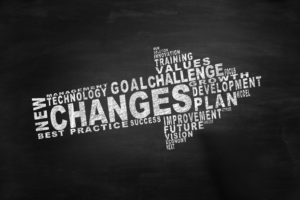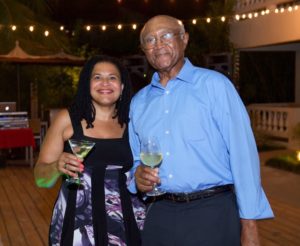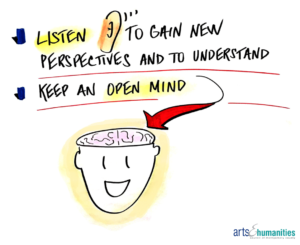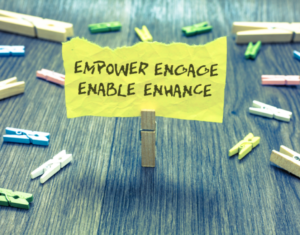Dear Colleagues,
I’ve been thinking about leadership in the creative sector and considering how we navigate our ever-changing world. I’ve long been a champion of innovation, ingenuity, and ideas that spark creativity. Whether you’re exploring how to build a tune from a few notes, constructing a building emanating from a community need, or writing a book, success hinges on having effective, and at times inventive, strategies to achieve your goals, right? But how do you develop these strategies? By overcoming obstacles and adapting to challenging and complex environments, right? Yep! But that’s easier said than done.
 This brings us to my essential question: How do leaders adapt as conditions threaten to reshape our environments? Do we hold on to preexisting world views on leadership, or is it necessary to review, reconsider, and re-evaluate our environments to develop effective strategies for success?
This brings us to my essential question: How do leaders adapt as conditions threaten to reshape our environments? Do we hold on to preexisting world views on leadership, or is it necessary to review, reconsider, and re-evaluate our environments to develop effective strategies for success?
And if so, what tools, strategies, and practices do leaders need to overcome obstacles, accomplish meaningful change, and adapt to challenging and complex settings? How do leaders thrive in ever-evolving, multicultural, multigenerational, multidimensional environments? And what leadership qualities must we leverage as we consider organizational change?
For starters, I think having a strong moral compass in place is important. Ethics and integrity are essential leadership qualities and can set the tone for modeling behavior for colleagues, partners, and communities. Next, we must acknowledge and understand the strengths, weaknesses, opportunities, and threats facing our business. Adaptive leaders are mindful of their environments and the conditions shaping them. Lastly, while our work may elicit strong emotional responses, it’s crucial to develop an ability to manage our own emotions while also understanding the emotions of people around us. Being self-aware and leveraging skills like empathy, patience, and understanding allows leaders to consider how interpersonal reactions may affect outcomes while practicing equity. People must trust us.
Here’s what I mean:
 I recently spoke with my 98-year-old dad, an engineer and former manager of international business operations for a large multinational corporation in the ’60s. I asked if it was important for him to develop the tenets of adaptive leadership in his long career, and if so, what he learned from this practice. He emphatically said that adaptive leadership was critical, recalling one situation where his company ventured to establish a manufacturing plant in an island nation best known for its tourism. After assessing the situation, he shared his research with the company and told them he did not believe the recommended locale was suitable for the type of manufacturing operation the company envisioned. Dad learned that the workers were unfamiliar with manufacturing operations, earned better wages in the tourism and hospitality industries, and had more family-friendly, flexible schedules than the manufacturing plants proposed. Nonetheless, the company established a manufacturing plant, and despite the investment of time and resources, the community did not embrace the operation at any level. Riddled with challenges, the manufacturing plant closed within a year. This company failed at cultural competence and trust. They relied on weak research and an unwillingness to listen to a mid-career African American leader who understood the environment. Both his and the island community’s trust were diminished from the onset, and the results were less than favorable for everyone. Despite Dad’s vision, corporate leadership refused to adapt, and it cost them.
I recently spoke with my 98-year-old dad, an engineer and former manager of international business operations for a large multinational corporation in the ’60s. I asked if it was important for him to develop the tenets of adaptive leadership in his long career, and if so, what he learned from this practice. He emphatically said that adaptive leadership was critical, recalling one situation where his company ventured to establish a manufacturing plant in an island nation best known for its tourism. After assessing the situation, he shared his research with the company and told them he did not believe the recommended locale was suitable for the type of manufacturing operation the company envisioned. Dad learned that the workers were unfamiliar with manufacturing operations, earned better wages in the tourism and hospitality industries, and had more family-friendly, flexible schedules than the manufacturing plants proposed. Nonetheless, the company established a manufacturing plant, and despite the investment of time and resources, the community did not embrace the operation at any level. Riddled with challenges, the manufacturing plant closed within a year. This company failed at cultural competence and trust. They relied on weak research and an unwillingness to listen to a mid-career African American leader who understood the environment. Both his and the island community’s trust were diminished from the onset, and the results were less than favorable for everyone. Despite Dad’s vision, corporate leadership refused to adapt, and it cost them.
In the nonprofit arts arena, we’ve witnessed organizations uphold policies, processes, or programs that create untenable work environments. These rigors can look like resistance to remote or flexible work schedules, resistance to hiring diverse and emergent leaders and supporting them in senior positions, and programming that is not aligned with the communities’ stated needs. We’ve also seen “mission drift”, a concept where organizations’ programming or operations drift between various ideas rather than establishing and adhering to a strong vision that connects them and their work to the communities they serve. This lack of focus leaves organizations without strong ties to anywhere or anyone, which diminishes community trust and may lead to diminished ticket sales, program fees, and donations.

So, how can leaders become comfortable with the idea that new information can inform decisions in various ways and embrace an adaptable mindset to ensure success in reaching their goals?
For one, we must invest in our leadership skills. Understanding the tenets of leadership is critical and will further our belief and trust in ourselves. We know what to do, and while leveraging our experience and expertise, we must also be open to learning. Trusting ourselves.
For another, we must believe communities and willingly learn how a shift in power dynamics provides opportunities for communities to decide what they need and how they need to be led. This helps leaders better align their leadership skills with issues the community wants to address and centers community voice when addressing the need. Nothing about us, without us, can be for us.
While it may feel as though this power shift could dilute one’s ability to lead, I’ve personally learned that sharing power can be quite freeing. Sharing power provides me with opportunities to focus and leverage my sharpest skills when necessary while also following the leadership of others at times. This unlocks opportunities for leaders to consider new and inventive perceptions, discoveries, and innovations. Trust the process.
Once leaders are willing to share power, they can adapt and conceive new ways to utilize the multifaceted leadership tools in their toolbox to support the operations needing support. Trust the outcome; it may fly in the face of preconceived notions.
 |
 |
In summary, adaptive leaders leverage strong leadership skills by leaning into their moral compass, clearly understanding their environments, practicing equity and empathy, and believing emergent and established communities. As we consider leading in this multicultural, multiracial, multigenerational, multifaceted community that is Montgomery County with impactful initiatives that drive community and economic impact, we must consider implementing strategies and practices to overcome obstacles, accomplish meaningful change, and adapt to challenging and complex environments.
Join me. I know it’s possible!
Onward!
Suzan
